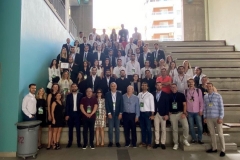
İŞLETME FAKÜLTESİ
Lojistik Yönetimi
2011-2012 Güz Dönemi Lisansüstü Sunumları
DEPARTMENT OF LOGISTICS MANAGEMENT
GRADUATE PRESENTATIONS
(GSS500 SEMINAR & LOG597 TERM PROJECT & LOG599 THESIS)
Presentation Program
January 20th, 2012, Friday, 13:30-16:40, C401
13:30-14:00 Özge AKINCI
Collaboration Opportunities among Third Party Logistics Providers
14:00-14:30 Aşkın ÖZUĞURLU
Supplier Evaluation Methodology in Service Purchasing
14:30-15:00 Tuğçe ÇEVİK
An Evaluation and Selection Method for the Location of a Freight Village with an Application to İzmir
15:00-15:10 Break
15:10-15:40 Ahu YİĞİTTEKİN
Analysis of IT Outsourcing Criteria of Freight Forwarders in Turkey – LATEK LOGISTICS’ process through SAP
15:40-16:10 Tunca TABAKLAR
Managing Risk in Supply Chains with the Integration of Business and Humanitarian Logistics
16:10-16:40 Cansu KANDEMİR
Impacts of Supply Chain Design Parameters on Retailer In-Store Logistics Performance
January 23rd, 2012, Monday, 14:30-15:00, C401
14:30-15:00 Yiğit ÇEVİK
Redesigning the Urban Distribution Networks for e-commerce Deliveries
Abstracts
Collaboration Opportunities among Third Party Logistics Providers
Özge AKINCI
Supervisors: Öznur YURT, Özgür ÖZPEYNİRCİ
By the raising competition and globalization, supply chain members tend to generate collaborative relationships in order to have stronger position in the market. This study analyzes the collaboration forms and structures between third party logistics (3PL) providers by analyzing logistics sector, benefits and challenges of collaboration, collaboration forms, and applications. We review the literature on collaboration and 3PL providers. We plan to analyze the 3PL sector and determine the most suitable forms of collaboration including vertical integration.
Supplier Evaluation Methodology In Service Purchasing
Aşkın ÖZUĞURLU
Supervisor: Muhittin Hakan DEMİR
Purchasing is an important process both for company and supply chain, since it has a critical role on logistic performance. Logistic service buyers have started to change the type of relationship established with its suppliers. The basis of this change is to be successful and main functions’ success is not enough. Each member of the supply chain has to demonstrate maximum performance accordingly. With the increase of competition, supplier selection and supplier evaluation has gained importance. To get maximum performance from suppliers, selecting right supplier is not enough. Correct measurement of the performance of the supplier and managing the supplier relations is essential requirement.
The supplier evaluation studies based on material purchasing approach has been done both by academic framework and business framework. With the increase in service offerings in the early 2000s, necessity of service evaluation has born. Since these evaluation methodologies have been converted from material evaluation criteria’s, they haven’t fit exactly. This has brought a necessity to look for a new methodology.
Developing an effective supplier’s evaluation system for service purchasing and increase the supplier management by using the results taken from this system is the main goal of this research. Within the framework of this study, necessity of creating a special method for the service or for company’s industry and adequacy of a standard assessment method for all types of service purchasing will be examined. How to evaluate the results that is generated by designated method, and how to use the outcomes for management of suppliers will be determined.
An Evaluation and Selection Method for the Location of a Freight Village
with an Application to İzmir
Tuğçe ÇEVİK
Supervisor: Ahmet CAMCI
In the last few decades two important trends which have been in the focus of logistics management researchers and practitioners are intermodal freight transportation and designing the distribution networks as hub-and-spoke networks. Globalization, along with many others, is the major factor which stimulates the rise of these issues. The efforts to combine these two issues in a single framework led the idea of a freight village. A freight village which replaces the standard transport terminal works as the hub of a transportation network at which the mode of transport can be changed from one to another. It is an intermodal terminal providing auxiliary facilities such as warehouses, groupage activities, customs, maintenance workshops, banks, insurance offices and other services for both national and international transit. The choice of the location of a freight village is based on several criteria. The technical, financial, macro-economic, spatial and environmental parameters have important effect on the decision. The decision for the freight village location should also take into account the current market status and trends along with the uncertain future conditions. In this study, we will demonstrate a method which can be used in determining the location of a freight village. We will use the method to determine the location of a freight village in İzmir.
Analysis of IT Outsourcing Criteria of Freight Forwarders in Turkey –
LATEK LOGISTICS’ process through SAP
Ahu YİĞİTTEKİN
Supervisor: Öznur YURT
The aim of this study is twofold: to determine the basic IT outsourcing criteria of freight forwarders in Turkey and to explore the effects of IT strategy of freight forwarders in competitive advantage.
The freight forwarders’ basic role is, by considering their customers’ needs and requests, to manage the door-to-door transportation by determining the most convenient and most efficient transportation mode and to be a solution to their customers’ needs. But it should be noticed that freight forwarders’ suppliers might be the direct service providers’ to the customers, instead of using freight forwarders’ services. Under these circumstances freight forwarders’ difference is not only to consolidate or organize the transportation but to use an efficient information technology to support their services and to support their decision making process. IT system is crucial, if the freight forwarders are to survive in the future in this competitive world. Within this study we try to analyze how freight forwarders decide (make or buy) their IT systems in Turkey and to determine basic criteria by studying one of the freight forwarder’s decision processes in Turkey.
Managing Risk in Supply Chains with the Integration of
Business and Humanitarian Logistics
Tunca TABAKLAR
Supervisors: Muhittin Hakan DEMİR, Öznur YURT
The new business era defined by the highly globalized age makes it more difficult to manage supply chains every day. There are numerous external factors that affect supply chains and cause disruptions in supply chain operations. By the structure it induces, globalization makes supply chain more vulnerable to such disruptions. One may recall the recent earthquake and tsunami in Japan that caused production to stop in factories in Turkey and in the USA. Clearly, one of the most important and strongest factors is disasters. Disasters may destroy the supply chain, which in advance brings out considerations for designing new supply chains. To this extent, logistics researchers study supply chain redesign with two main points of view: Business and humanitarian logistics viewpoints. In commercial supply chains, the primary objective is to maximize profit, at the same time, to minimize logistics cost and to provide sustainability of the product or service. Whereas, in humanitarian supply chains, the primary objective is to minimize the total number of deaths and human sufferings with a given budget. In this thesis, we aim to provide an integrated approach to disaster management that uses objectives and methodologies from both viewpoints. We include an analysis that involves a comparison and contrast of humanitarian logistics and business logistics. Consequently, we propose a conceptual framework for these two viewpoints and test the framework via analytical methods.
Impacts of Supply Chain Design Parameters on Retailer In-Store Logistics Performance
Cansu KANDEMİR
Supervisor: Muhittin Hakan DEMİR
Due to the complex structure of today’s supply chain and recent competition in the retailing industry, retailers are striving to improve their operations in order to run their stores more efficiently. In that case, the final few meters of the supply chain may be most crucial and directly affect significant performance parameters such as customer service levels, store revenues, stock out costs, and inventory costs. The traditional approach concentrates mainly on the internal management of the dynamics of in-store logistics. In this study, we look at the problem with a broader perspective. We question the interaction between supply chain structural parameters and in-store logistics. Namely, we aim to identify the effects of supply chain parameters such as number of suppliers, number of distribution centers, inventory management policies, stock replenishment intervals and number of stock keeping units as well as internal parameters such as product assortment, product display area selection, shelf space allocation, inventory control, product handling, shelf replenishment, and back store management on in-store logistics performance. In doing so, we define the environmental parameters. We employ simulation as an analytical tool for our research using ARENA simulation software.
Redesigning the Urban Distribution Networks for e-commerce Deliveries
Yiğit ÇEVİK
Supervisors: Özgür ÖZPEYNİRCİ, Murat AŞKAR
The rise of electronic commerce (e-commerce) has captured a tremendous amount of attention in the last decade. This change severely affected the third party logistics service provider (3PL) companies since e-commerce deliveries differ from traditional deliveries in two main aspects: the average shipment size and the frequency of deliveries. As a result 3PL companies are redesigning their distribution networks in order to simultaneously decrease the costs and increase the on time delivery performance. This study is based on an innovative distribution idea applicable especially to e-commerce deliveries. The aims of this study are (i) redesigning the urban distribution network for e-commerce deliveries, and (ii) analyzing the potential impacts of this idea with an application to İzmir.
HABER |TÜM HABERLER

Lojistik Yönetimi Bölümü 15. Üniversite-Sanayi İşbirliği Gerçekleşti!
Lojistik Yönetimi Bölümü son sınıf öğrencilerinin 2022-2023 Akademik Yılı boyunca İzmir Büyükşehir Belediyesi, Havi Lojistik, Hapag Lloyd, Dsv Lojistik, Maxion Wheels, ve

İsveç’teki Gençlerin Kariyerine Işık Tutuyor
İzmir Ekonomi Üniversitesi (İEÜ) Lojistik Yönetimi Bölümü Öğretim Üyesi Doç. Dr. Aysu Göçer, uluslararası alandaki başarılı çalışmalarıyla fark yaratarak İsveç’teki dünyaca ünlü

'Aile Bursu' 78 Gence Ulaştı
Türkiye’nin en büyük nakliyat firmalarından birinin kurucusu olan İzmirli hayırsever merhum Doğan Turhan adına verilen eğitim bursu, 8 yılda 78 gencin hayalini

'Aile Bursu' 78 Gence Ulaştı
Türkiye’nin en büyük nakliyat firmalarından birinin kurucusu olan İzmirli hayırsever merhum Doğan Turhan adına verilen eğitim bursu, 8 yılda 78 gencin hayalini

2022-2023 Akademik Yılı Doğan Turhan Bursu başvuruları başlamıştır. Son gün 12.10.2022!
Doğan Turhan Bursu, Lojistik sektöründe uzun yıllar görev yaparak Türkiye’de bu sektörün gelişmesine çok önemli katkılarda bulunan ve Lojistik alanında kendi firmasını

Lojistik sektörüne ‘genç’ çözümler
İEÜ’lü gençler, projelerini hazırlarken çeşitli sektörlerden lider firmaların temsilcileriyle birlikte çalıştı. Her projeye, en az bir öğretim üyesi akademik danışmanlık desteği verirken,

‘Yeşil’ lojistik İngiltere’ye açıldı
İzmir Ekonomi Üniversitesi (İEÜ) Lojistik Yönetimi Bölümü’nden Doç. Dr. Işık Özge Yumurtacı Hüseyinoğlu ve 3 öğrencisi, daha az maliyetli ve çevreci bir

Lojistik sektörüne ‘genç’ çözümler
İzmir Ekonomi Üniversitesi (İEÜ) İşletme Fakültesi Lojistik Yönetimi Bölümü son sınıf öğrencileri, gelenekselleşen üniversite-sanayi iş birliği etkinliğinde, geliştirdikleri projeler ve sundukları çözüm




